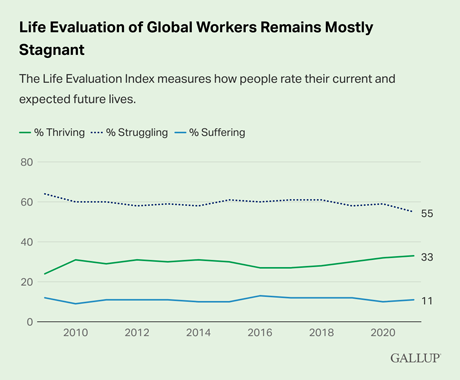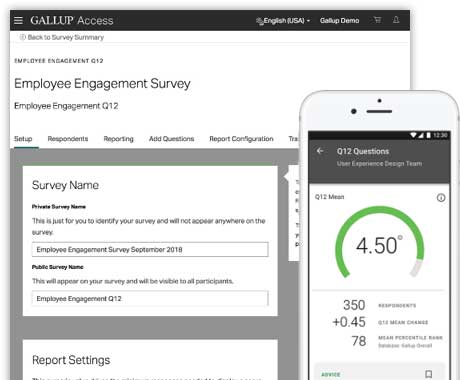Story Highlights
- Gen Z and millennials now make up 46% of the full-time U.S. workforce
- Gen X and Baby Boomers prioritize their desire for ethical leadership
- Diversity and inclusion are very important to younger generations
According to Gallup, Gen Z and millennials now make up nearly half (46%) of the full-time workforce in the U.S.
To develop the next generation of organizational leaders, every employer needs to be asking: What do our younger workers want from the workplace?
In 2018, Gallup asked Gen Z and millennials what they look for most in an employer -- and their answers were surprisingly similar. In fact, these themes have only been amplified over the past year.
| Young Millennials & Gen Z: 1989-2001 | Older Millennials: 1980-1988 | Gen X: 1965-1979 | Baby Boomers: 1946-1964 | ||||||||||||||||||||||||||||||||||||||||||||||||||||||||||||||||||||||||||||||||||||||||||||||||
|---|---|---|---|---|---|---|---|---|---|---|---|---|---|---|---|---|---|---|---|---|---|---|---|---|---|---|---|---|---|---|---|---|---|---|---|---|---|---|---|---|---|---|---|---|---|---|---|---|---|---|---|---|---|---|---|---|---|---|---|---|---|---|---|---|---|---|---|---|---|---|---|---|---|---|---|---|---|---|---|---|---|---|---|---|---|---|---|---|---|---|---|---|---|---|---|---|---|---|---|
| 1. The organization cares about employees' wellbeing. | 1. The organization cares about employees' wellbeing. | 1. The organization's leadership is ethical. | 1. The organization's leadership is ethical. | ||||||||||||||||||||||||||||||||||||||||||||||||||||||||||||||||||||||||||||||||||||||||||||||||
| 2. The organization's leadership is ethical. | 2. The organization's leadership is ethical. | 2. The organization cares about employees' wellbeing. | 2. The organization cares about employees' wellbeing. | ||||||||||||||||||||||||||||||||||||||||||||||||||||||||||||||||||||||||||||||||||||||||||||||||
| 3. The organization is diverse and inclusive of all people. | 3. The organization's leadership is open and transparent. | 3. The organization's financial stability. | 3. The organization's financial stability. | ||||||||||||||||||||||||||||||||||||||||||||||||||||||||||||||||||||||||||||||||||||||||||||||||
| Gallup | |||||||||||||||||||||||||||||||||||||||||||||||||||||||||||||||||||||||||||||||||||||||||||||||||||
1. Above all, Gen Z and millennials want an employer who cares about their wellbeing.
The year 2020 brought employee wellbeing into the foreground. If the people in your organization aren't healthy -- physically and emotionally -- your organization isn't healthy either. But an organization's stance on employee wellbeing has long been a major factor in where people want to work and how they feel about their current employer -- in fact, it was a top three issue for every generational cohort before COVID-19.
To develop the next generation of organizational leaders, every employer needs to be asking: What do our younger workers want from the workplace?
Most organizations have wellness programs -- but physical wellness alone isn't enough. For example, young employees may be physically healthy but suffer from social isolation that hurts their productivity. Entry-level workers may be experiencing acute financial hardship that affects their daily performance. Gallup has identified five elements of wellbeing: career, social, financial, community and physical. Each element influences the others, and thriving in all of them is necessary for a life well-lived.
2. Gen Z and millennials want their leaders to be ethical.
2020 was a record-breaking year for SEC fines and fines related to corporations. Combined with high-profile fraud scandals of recent years, these generations have grown up watching a parade of breaking news of unethical behavior.
Without question, ethical scandals are toxic to organizational health and success. And it's not just a compliance or public relations issue anymore. Employees themselves want more than the legal minimum or executive platitudes. They expect bold action to address moral blind spots. And they want to know that the work they are doing has a net positive impact on human beings and the natural world.
But there's a deeper issue that cuts to the heart of every team: the productivity value of trust. When team members trust one another, everything works better. Do your employees think the people on their team are committed to quality work? Can people collaborate together, knowing that everyone is being honest? Do workers -- regardless of their rank -- feel like their concerns will be heard?
Notably, Gen X and Baby Boomers also rate ethics highly -- in fact, it's the top attribute they want in an employer. One question to consider is how different generations may see ethics differently.
Older generations may associate ethical behavior with personal character. Younger generations are concerned with people and the planet.
3. Older millennials want open, transparent leaders.
The millennial generation is unique in its desire for leaders who are open and transparent. This may be because many of them entered the workforce during the 2008 financial crisis -- the result, in part, of subprime mortgages bundled to look much better than they were.
Millennials also received mixed messages about a fundamentally strong economy -- even as the bottom was falling out. And some of them may feel they were duped into easy but burdensome student loans that they are still paying off more than a decade later.
As a result, millennials in their 30s may have more of a "trust but verify" approach to corporate positivity. If you have a lot of millennials in your organization, they may want more facts, data and third-party validation to feel confident in your leadership.
Notably, this is one area in which corporate leaders have excelled during the COVID-19 pandemic. Employee engagement in the U.S. rose over the past year, and CHROs from the world's largest corporations have noted that increased communication and town hall meetings have been well-received.
If you have a lot of millennials in your organization, they may want more facts, data and third-party validation to feel confident in your leadership.
4. Gen Z and younger millennials want leaders who support a diverse and inclusive workplace.
Younger generations grew up in a world that was far more diverse than previous generations. They demand respect, equity and inclusion -- and they are voting with their consumer and employment choices. Diversity, equity and inclusion (DEI) is not a "nice to have" for this generation; it's an imperative that is core to their personal identities.
While U.S. employee engagement in 2020 showed a calendar-year surge, it took a historic drop in the summer during the George Floyd protests. And corporate leaders took notice. DEI is now a top priority for business leaders across the country -- as it has been for younger workers for a while now. One way to think of DEI in the workplace is individualized respect. Young people want to be appreciated for their unique contributions, and they want to feel respected. As with ethics, DEI is not just a question of corporate policy. It affects how employees accomplish their daily work. Disrespect breeds distrust, which destroys collaboration and honest communication. Respect and recognition matter from every direction -- peers, managers, policies, systems and leaders.
Much like the discussion of ethics above, a "do no harm" approach to DEI is not enough. Younger generations expect to be coached and developed in their workplace. Gallup analytics shows millennials are more likely than the previous generation to say that development opportunities and "quality of manager" are extremely important in a new job. Young employees want a manager who cares about them as a person and who is actively engaged in their career growth.
In other words, younger generations want ESG.
Although measurements for socially responsible organizations have been around for decades, these environmental, social and governance (ESG) criteria are increasingly at the forefront of investor, board and executive conversations. While it's proven that ESG measures have a strong relationship to financial performance, a broad benchmarking standard does not exist for the "people pillar" of ESG.
What we are seeing now is a convergence of international corporate leadership, investor interest and generational demands. The questions that Gallup has asked above -- on ethics, environment, wellbeing and inclusion -- will soon be the basic social yardsticks by which every organization's purpose will be measured.
Meet the needs of the new workforce.
If you're struggling to inspire the millennials and Gen Z employees in your workplace, consider the following steps:
Start leadership-level conversations that address these four factors in your culture.
If your organization has not addressed the above items -- wellbeing, ethical and transparent leadership, and diversity, equity, and inclusion -- recently, it's time to start having these conversations with your leadership team. They aren't topics just for "young people." Each topic is also relevant for older generations. Your leadership team may not agree that these items matter. That itself is a conversation worth having.
Respect and recognition matter from every direction -- peers, managers, policies, systems and leaders.
Coach your managers to communicate and deliver on your organization's promises.
You may already have programs and policies in place to address these items. But those efforts fall short if your front-line employees aren't aware of them. Employees experience your organization through their manager. If your managers aren't doing it, it's not your culture. It is imperative that managers are trained to care about employees as people and set expectations of ethical and inclusive behavior.
Integrate these themes into every stage of the employee life cycle.
Leaders need to take a hard look at their current talent strategy to see how it stacks up against the wants and needs of today's young workforce. For example:
Does my talent attraction strategy include an emphasis on employee wellbeing?
Does my onboarding program address ethics in a meaningful way?
How transparent and open are our leaders when they communicate downstream?
How does my system for advancement and promotion address diversity and inclusion?
Leaders can't address these factors in a one-day event. They require full integration into your culture, and your employees must experience them in real-life interactions with your organization.
Understand your workforce better:
- Learn more about our pulse surveys in Gallup Access.
- Subscribe to the Gallup at Work newsletter for the latest generational workforce insights.
- Contact us to discuss how you can support your employees' wellbeing, regardless of generation.






